
Farmers protesting against the new farm laws at the Singhu border
The 3 contentious laws that could change the way India's farmers do business have sparked one of India's biggest protests and a nearly year-long standoff with the government. Click here to know all about these laws and the perspectives of all stakeholders on it.
31 Oct 21
- 3rd Oct marked a dramatic escalation in the 10 month long protest when a convoy of 3 SUVs owned by a Union Minister of State for Home Ajay Mishra, ran over protesting farmers in Lakhimpur Kheri, a district in Uttar Pradesh. Eight people, including four farmers, were killed in the incident. One of the SUVs was allegedly driven by Ashish Mishra, the son of Ajay Mishra against whom a case has been registered. The violence erupted as a group of farmers tried to block Union Minister Ajay Kumar Mishra and Deputy Chief Minister Keshav Prasad Maurya from visiting. The farmers were upset with the Union Minister over his earlier statement in which he said the farm protests involved just "10-15 people" and that "it would take just two minutes to make them fall in line". Opposition leaders from Congress, AAP, BSP, Samajwadi Party were stopped from visiting the area after the incident. Priyanka Gandhi Vadra who tried to enter Lakhimpur to support the grieving families of those killed was illegally detained for over 2 days. Akhilesh Yadav was detained from outside his residence in Lucknow where he staged a sit-in after being stopped from visiting Lakhimpur Kheri. Following this, all Opposition parties accused the BJP government in the state of “throttling democracy” and “trying to cover up the incident”. They also questioned the silence of PM Narendra Modi and Home Minister Amit Shah on the issue.
30 Sep 21
- On 27th Sep, farmer organisations called a "Bharat Bandh" as part of their protest against the farm laws. The Samyukta Kisan Morcha (SKM), an umbrella body of over 40 farm unions, led the day-long protest that caused many government and private offices, educational institutions, shops, industries and commercial establishments to remain closed across the country. Many political parties, including Congress Party and Bahujan Samaj Party called upon their supporters to participate in and support the farmer's protest in a peaceful manner.
- Hours before PM Narendra Modi's first bilateral talks with Joe Biden scheduled on 24th Sep, farmer leader Rakesh Tikait sent out an appeal to the US President drawing his attention to the controversial farm laws passed by the Centre.
Dear @POTUS, we the Indian Farmers are protesting against 3 farm laws brought by PM Modi's govt. 700 farmers have died in the last 11 months protesting. These black laws should be repealed to save us. Please focus on our concern while meeting PM Modi. #Biden_SpeakUp4Farmers
— Rakesh Tikait (@RakeshTikaitBKU) September 24, 2021
- On 22nd Sep, Haryana Home Minister Anil Vij directed officials to immediately open alternative routes in Sonipat and Jhajjar districts towards Delhi as the Singhu and Tikri borders remain closed due to the farmers' protest.
- On 07 Sep, a member of the Supreme Court-appointed panel on farm laws wrote to Chief Justice of India NV Ramana requesting that a report submitted on the issue on 19th March be made public. He said the report submitted by the committee is "cent per cent" in favour of farmers and that the Supreme Court must take up the matter without any delay.
- On 11th Aug, Punjab Chief Minister Captain Amarinder Singh met with Prime Minister Narendra Modi and requested him to start the process of withdrawing controversial farm laws. He also asked PM Modi to amend the relevant law for including farmers in free legal aid category.
31 Jul 21
- On 30th Jul, the Delhi Legislative Assembly passed a resolution seeking the withdrawal of the three controversial farm laws introduced by the Central government.
- On 26th Jul, Rahul Gandhi today drove a tractor to Parliament carrying a warning, farmers' message and registering his protest against the three agricultural laws. He subsequently tweeted that "tractors will run in Parliament" if farmers are forced to sell their land.
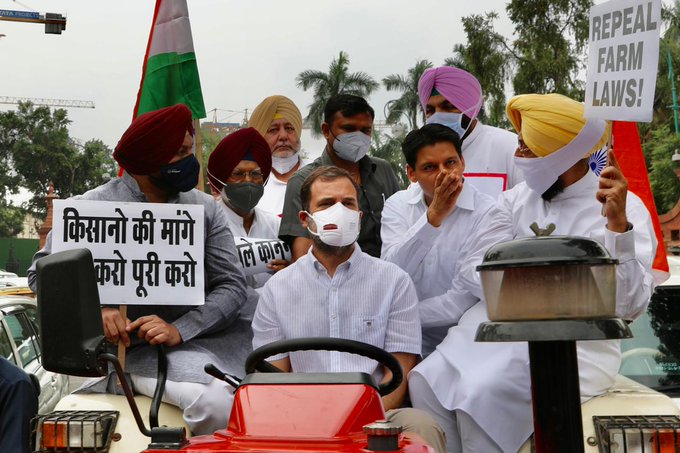
- On 22nd Jul, a group of 200 farmers protesting the Centre's three controversial farm laws started a 'Kisan Sansad' at central Delhi's Jantar Mantar, a few metres away from Parliament where the Monsoon Session is underway. They said that the idea behind organising the 'Kisan Sansad' was primarily to show that their protest is still alive and remind the Centre that they too know how to run the Parliament. Later on 26th Jul, many women protesters participated in a protest against the three farm laws at Jantar Mantar and said that they will run all-women independent "Kisan Sansad".
- On 6th Jul, the Shiv Sena-led MVA government in Maharashtra introduced three amendment bills in the assembly related to agriculture, co-operation, food and civil supplies, to counter the new farm laws enacted by the Centre. The bills have provisions for a higher rate than the MSP for produce in farming agreement with traders, timely payment of dues, three-year jail term and ₹ 5 lakh fine or both for harassment of farmers. Revenue Minister Balasaheb Thorat said the central farm acts were passed without discussion and several of their provisions encroached on rights of state governments which necessitated these amendment bills by the states.
30 Jun 21
- Farmer leaders on 26th June virtually spoke to Lieutenant Governor Anil Baijal after they claimed they weren't allowed to meet him and submitted to his representative a memorandum addressed to the president demanding repeal of the three farm laws and a new law to ensure guarantee for MSP.
- On 18th June, union agriculture minister Narendra Singh Tomar said that the government was ready to talk to the agitating farmers "even if they come at midnight", but not about their demand to repeal the three new laws which are the bone of contention.
- On 16th June, a 58-year-old farmer died allegedly after consuming poison at a site of protest against the Centre's three farm laws in Jind district in Haryana.
- On 10th June, Punjab CM Captain Amarinder Singh termed the hike in the Minimum Support Price (MSP) for paddy as "not only grossly inadequate but also an insult to the farmers who have been fighting for their rightful dues". He mentioned that a hike of 4% in MSP is inadequate to meet even the increased input costs, and citing the extraordinary hikes in diesel and other costs over the past one year and that these measly hikes will only discourage farmers from going in for the much-needed crop diversification to save the precious and depleting water resources. He stressed on the need to take the actual cost of production into account while measuring MSP and simplify procurement of all agricultural produce at MSP that fully covers farmers' cost plus 50% margin, as recommended by the Swaminathan Committee.
- On 26th May, farmers in Punjab and Haryana joined a "black day" call given by farmer unions to mark six months of their agitation at Delhi borders against the Centre's three contentious farm laws. They put up black flags atop their houses and burnt effigies of the BJP-led government at many places in Punjab.
31 Mar 21
- The farmers camping on the outskirts of Delhi and in Punjab burnt copies of the centre's new farm laws during 'Holika Dahan' - a ritual observed a day before the festival of Holi.
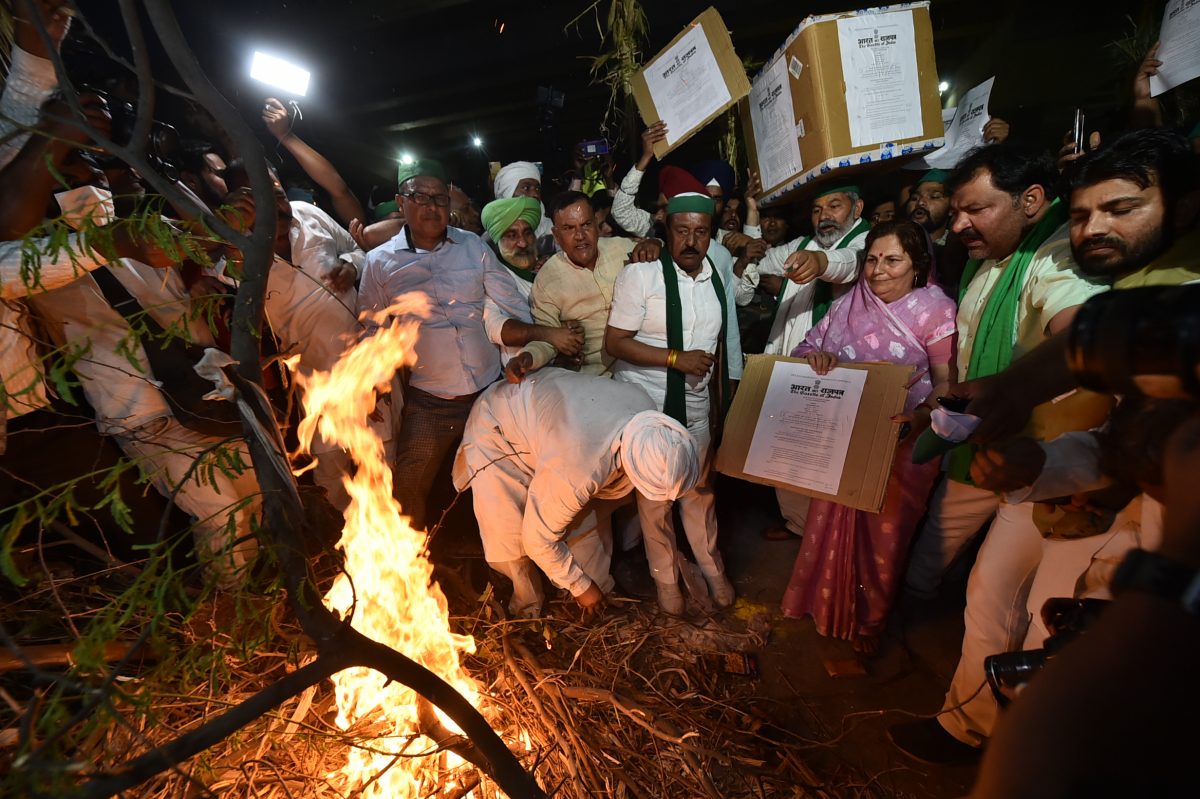
- On 28th Mar, Niti Aayog Member Ramesh Chand said that the target of doubling farmers' income by 2022 will not be fulfilled if the three new farm laws are not implemented immediately. He further added that the protesting farm unions should consider the government's offer of discussing the legislations clause by clause.
- On 19th March, the three-member committee appointed by the Supreme Court to help end the deadlock over the three contentious laws, submitted its report.
- The Rajya Sabha was adjourned from March 10 to March 15 after repeated uproars by the Opposition in the House against the recently enacted Central farm laws, rising fuel prices among other issues.
- India called in the British High Commissioner on 10th Mar to express its disapproval of the discussions on farmers' protest and press freedom in the British parliament, calling it "gross interference" and "votebank politics". This is the first time the government of another nation has officially conducted internal discussions on the protests which lasted for 90 minutes during which several MPs of the Labour party, Liberal democrats and the Scottish National Party raised concern over the Indian government's reaction to the protests. The British government responded by saying that it does not have a say on organizing or rejecting a "petition debate" which stemmed from an e-petition that attracted over 1,00,000 signatures on their parliamentary website.
- On 05th Mar, the Punjab Assembly passed a unanimous resolution seeking unconditional withdrawal of the three contentious farm laws by the Centre and to continue with the existing system of Minimum Support Price (MSP) based government procurement of food grains.
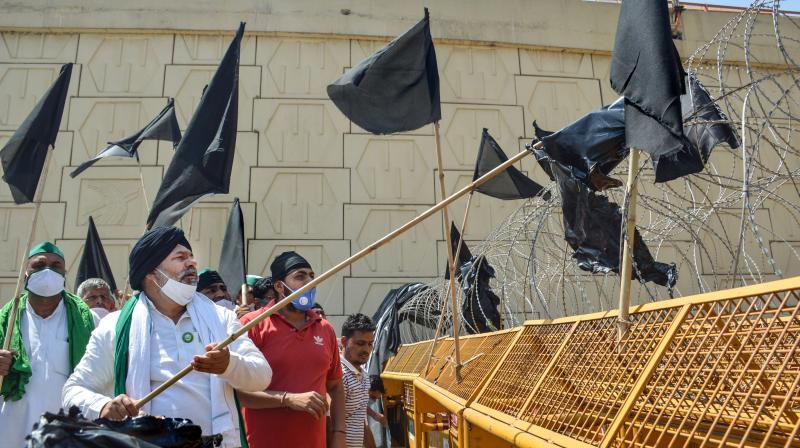
28 Feb 21
- Some farmers in Haryana resorted to destroying their wheat crop over 2 to 4 acres of their land in protest against the Centre's new agriculture laws. This prompted local political and farmer leaders to appeal to them not to resort to such drastic measures.
- On 21st Feb, the BJP passed a resolution thanking PM Narendra Modi for reforms in the agriculture sector and for his able leadership in effective handling of the COVID-19 situation. The resolution was passed in the first meeting of the BJP's new set of national office-bearers where PM Modi told party leaders to take the benefits of the new farm laws to the people.
- The Opposition parties raised slogans and staged a walkout during the Governor's address in the Uttar Pradesh Assembly on the first day of the Budget session on 18th Feb, opposing the Centre's three agriculture laws.
- On 18th Feb, farmers protesting against the Centre's new farm laws gathered near rail tracks in parts of Punjab, Haryana Uttar Pradesh, Maharashtra and Karnataka for the ''rail roko'' protest - a nationwide rail blockade to press for its demand to repeal the farm laws. Several train services were stopped in several areas as part of precautionary measure. The Samyukt Kisan Morcha (SKM), an umbrella body of the farm unions protesting against three new agriculture laws called its four-hour nationwide rail blockade a "peaceful and successful event" and said the Centre will have to repeal the legislations as "anger among farmers is intensifying" in the country.
- On 13th Feb, Haryana Agriculture Minister JP Dalal, in response to a reporter's query over the "death of 200 farmers", said that they would have died even if they had stayed back home. "Wouldn't they have died if they were at home? Had they been at their homes, they would have died there also. Out of one to two lakh, do 200 people not die in six months?" he asked, triggering laughter and joining in with a smile. After the tremendous backlash on social media, he submitted an apology stating that his comments were mis-interpreted.
- In preparation for a longer stay until their demands were met, many steps were initiated by the farmers at their protest site. Some of the measures included CCTV cameras for enhanced security, electric fans to beat the heat in the coming months and even a separate optical fibre line for wifi facility in case there is another internet shutdown at the protest site.
- On 10th Feb, Congress leader Priyanka Gandhi Vadra attended a ''kisan panchayat'' organised by the party in Saharanpur and announced that if voted to power her party would scrap the 3 farm laws.
- On 06th Feb, a three-hour nationwide "chakka jam" (blockade of national and state highways) by farmers was held amid a high alert in Delhi. Highways across north India, including the Eastern Peripheral Expressway around Delhi, were blocked by farmers protesting against the centre's three farm laws. The farmers have said there will be blockade in Uttar Pradesh and Uttarakhand in case they are "called to Delhi". Internet services were temporarily suspended during this period to ensure public safety.
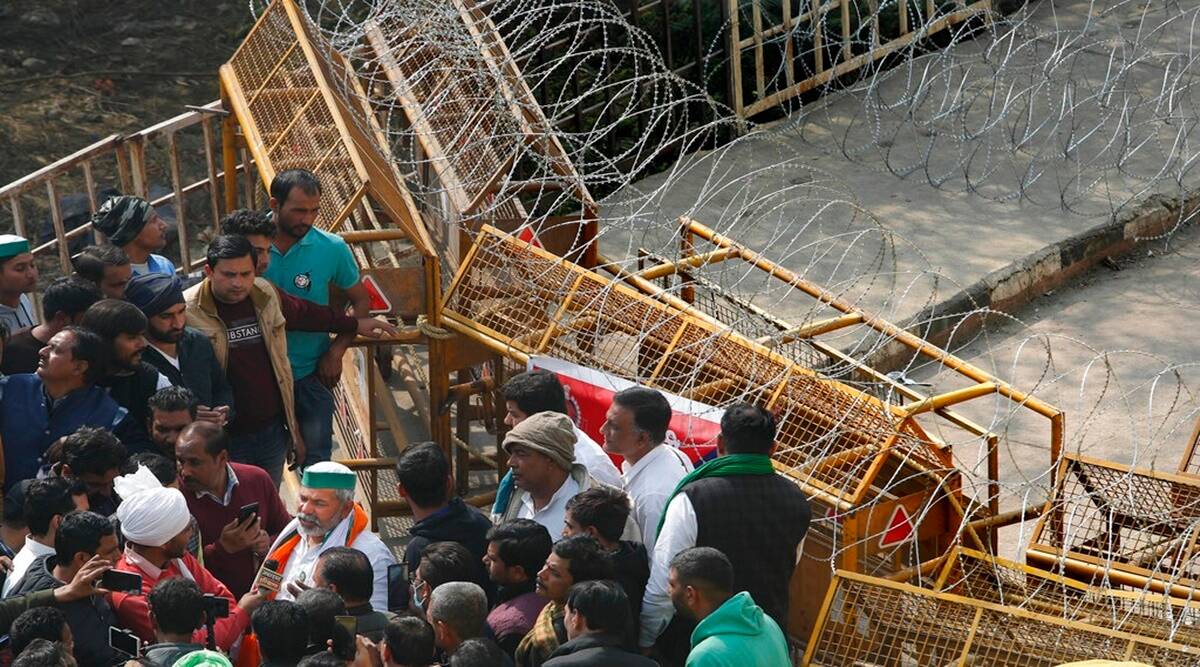
- On 05th Feb, 75 former civil servants, including Aruna Roy, Najeeb Jung and Julio Riberio, who are part of the Constitutional Conduct Group (CCG) submitted an open letter to the Centre whose approach towards the farmers' protest they felt, has been an adversarial and a confrontationist one from the very beginning. The said in the letter that the apolitical farmers were being treated like "an irresponsible opposition to be derided, demonised and defeated". The letter also requested the government to withdraw the legislations and think of other possible solutions instead of proposing half-hearted steps such as putting the laws on hold for 18 months.
- On 5th Feb, a large number of farmers gathered at Shamli in Uttar Pradesh today for a farmers' panchayat or meeting in solidarity with the protests outside Delhi despite a ban on the gathering. Thousands of farmers sat on the ground as songs imploring Prime Minister Narendra Modi to listen to the voice of farmers played out in the backdrop. Chants of "Inquilab Zindabad" were heard as more and more farmers walked or drove to the meeting on their tractors
- Lok Sabha proceedings were adjourned from 2nd to 5th Feb due to protests by opposition members who were demanding a separate discussion on the farm laws issue, a request denied by the Speaker.
- After the tweets put out by US singer Rihanna and climate activist Greta Thunberg on 02nd Feb and many other prominent foreign voices taking the farmers' protest to the world stage with their tweets, the government today put out a sharp and unprecedented response warning against the "temptation of sensationalist social media hashtags and comments" and said the protests were by "a very small section of farmers" in parts of India. This was followed by defensive responses by many pro-government artists and sportsmen supporting the laws. The speed and of their response and an uncanny similarity in their choice of words prompted another furore altogether with many liberals and Opposition leaders claiming that the artists were forced to come out and defend the government.
why aren’t we talking about this?! #FarmersProtest https://t.co/obmIlXhK9S
— Rihanna (@rihanna) February 2, 2021
31Jan 21
- The West Bengal Assembly passed a resolution demanding withdrawal of the Centre's new farm laws on 28th Jan. The West Bengal assembly is the sixth to pass such a resolution after Punjab, Rajasthan, Chattisgarh, Delhi and Kerala.
- On 26th Jan, farmers protesting against the new agricultural laws entered Delhi ahead of the huge tractor rally, knocking down the police barricades. Some of the farmers reached ITO and clashed with police which had to resort to lathicharge and use of tear gas. The farmers also entered Red Fort in large numbers and hoisted flags alongside that of the national flag. Over 300 cops were injured and 200 protesters were detained. Subsequently, rift within the farmers' groups surfaced as two groups pulled out of the protest - Kisan Sangharsh Committee and a faction of the Bharatiya Kisan Union saying, "We can't carry forward a protest with someone whose direction is something else."
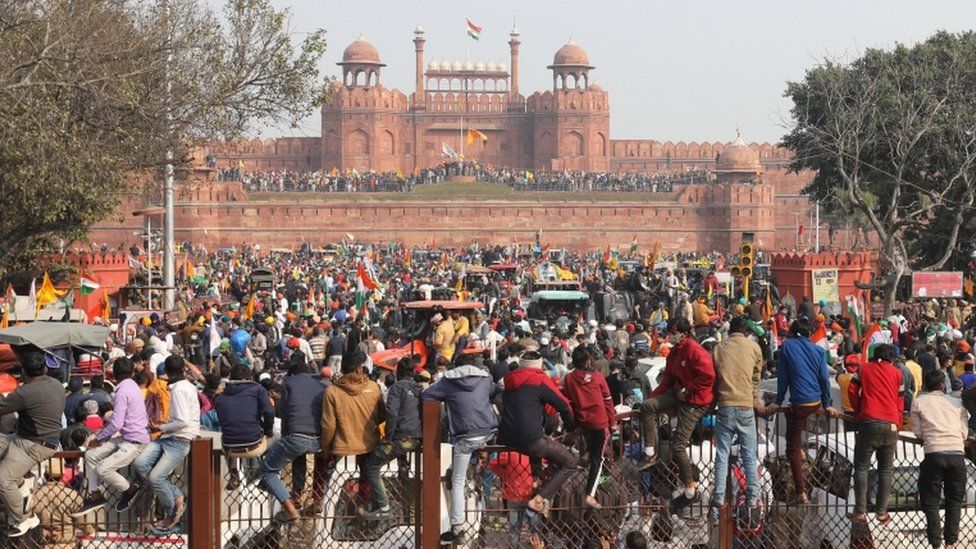 |
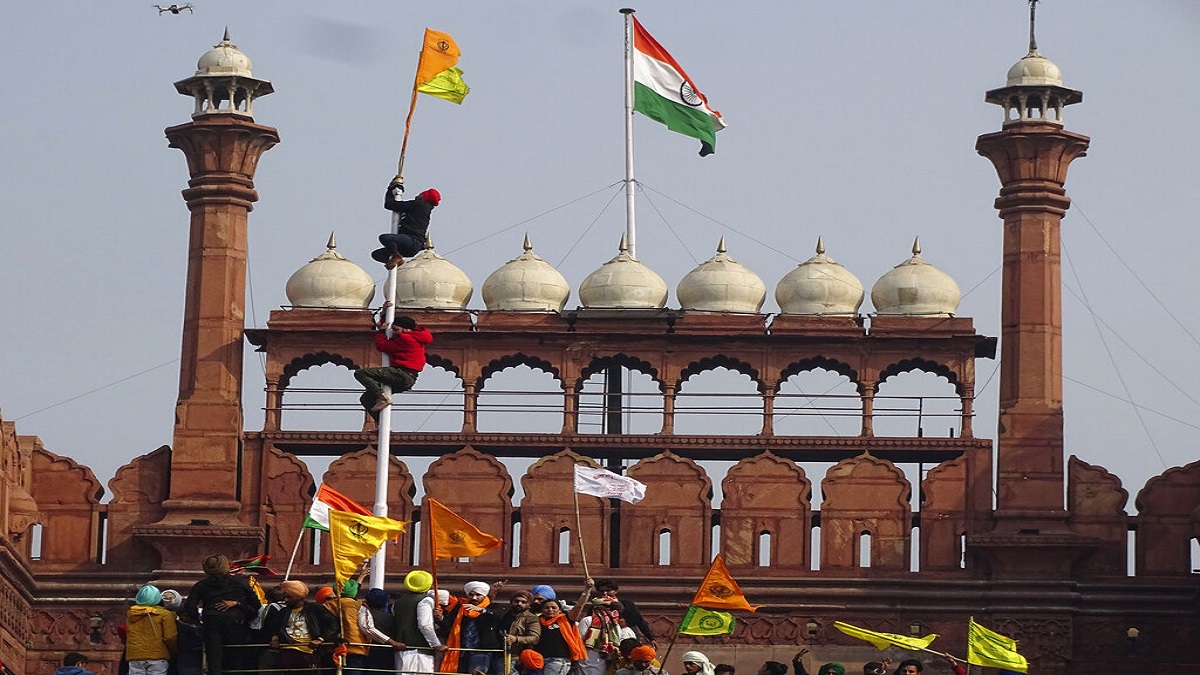 |
- On Jan 24th, farmers from Maharashtra's 21 districts, under the banner of the All India Kisan Sabha reached Mumbai to protest the farm laws.
- In the 10th round of discussions held between the government and the farmers union on 21st Jan, the government said that it is ready to put the three controversial farm laws on freeze for one-and-half years and will convey it to the Supreme Court in an affidavit. Claiming it to be the best it could do, the government said to the farmers that the "ball is in your court now". The government's proposal was immediately rejected by the farmers who vowed to continue the protest.
- On 15th Jan, Bhartiya Kisan Union president Bhupinder Singh Mann, one of the four members of the Supreme Court-appointed committee recused himself saying he did not wish to "compromise farmers' interests".
- The farmers' groups said they would not accept the Supreme Court-appointed committee which included members who had favoured the centre's laws and declared that they would amp up their protests across the country.
- The Supreme Court, led by Chief Justice SA Bobde, heard petitions challenging the farm laws and the farmer agitation on 12 Jan. It put on hold the 3 farm laws and formed a committee to to take forward the talks with the farmers. It also made some sharp comments on the issue:
- "We are not experts on agriculture and economics. Tell us whether you will put these laws on hold or else we will do it. What's the prestige issue here? We don't know if you are part of the solution or part of the problem."
- "We have an apprehension that someday maybe, there might be a breach of peace. Each one of us we will responsible if anything goes wrong. We don't want any injuries or blood on our hands."
- "We are extremely disappointed with government's handling of this issue. We don't see you are dealing with this issue effectively and don't know what consultative process you followed before the laws. Many states are up in rebellion. If vast majority says that laws are good, let them say it to a committee."
- "We have asked in the last hearing but no answer. The situation has gone worse. People have committed suicide. Why are the old and the women part of the agitation in this weather?. Let senior citizens, women and kids go back."
- When Attorney General KK Venugopal questioned the "hurry to pass orders", the Chief Justice snapped: "Don't lecture us on patience. We have given a long rope."
- On 9th Jan, a video by BJP MLA from Rajasthan Madan Dilawar was found circulating on social media where he mentioned that the farmers' agitation around the national capital could lead to a nationwide bird flu problem since the protesters are eating chicken biriyani to spread the epidemic. The protest, in his opinion was only a picnic as the protesters are relishing biryani and eating dry fruits. He also said that those who were conspiring to create such a crisis in the country could be terrorists, robbers, and thieves.
- The seventh round of discussions between the Centre and the farmers held on 5th Jan resulted in a deadlock. Sources said the government had proposed to discuss the farmers' demand for a legal guarantee for support price of crops, but the farmers' union leaders insisted on discussing the repeal of farm laws.
- On 4th Jan, Reliance Industries approached the Punjab and Haryana High Court requesting the government to safeguard its assets and services in the two states against "miscreants" who had damaged several of its telecom towers a few days earlier over the company's perceived role in framing three agricultural laws recently passed by Parliament.
- More than 850 faculty members of various educational institutions across the country such as JNU, BHU, DU, came forward with a signature campaign and an open letter in support of three contentious farm laws. They mentioned that they strongly believe in the government's assurance to farmers that their livelihood would be protected and the food would not be taken away from their plates. They further said that the new laws would free farm trade from all restrictions and enable farmers to do all transactions at competitive prices.
- On 2nd Jan, Kashmir Singh Ladi, a 75-year-old man from Uttar Pradesh was found dead today at the protest site on the Delhi-Ghaziabad border. A note written by him was found in which he expressed his frustration over the stalemate in talks with the government over the new agricultural laws that the farmers want repealed.
- On 1st Jan, the Kerala Legislative Assembly unanimously passed a resolution seeking the withdrawal of all the three contentious agricultural laws enacted hurriedly by parliament in September.
TO READ THE FULL ARTICLE

